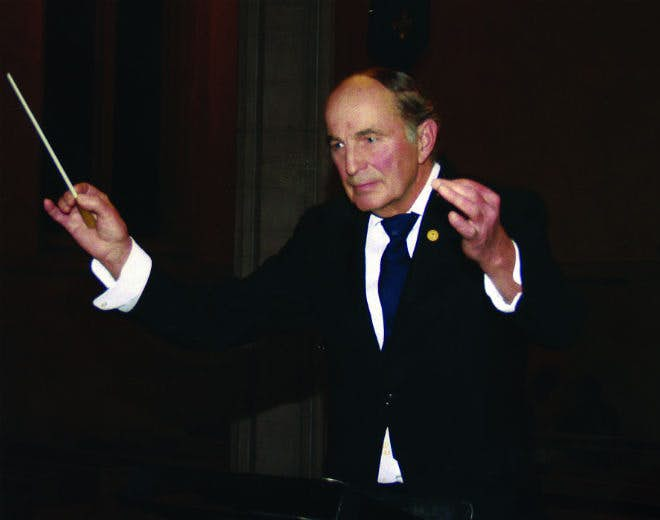Eight-Decade Connection with Nursing Inspires Don Messina Scholarship Gift
By Patrick Broadwater
Tuesday, June 12, 2018
As a history student at the University of Rochester in the mid-1950s, Don Messina ’56 ’57 used to enjoy going for a dip at the end of a long week of classes. The University pool was open for a free swim period on Friday nights, and students from across the campus would meet up there for a mix of athletic leisure and social activity.
Messina was doing freelance advertising and photography work at the time, and he got to know the nursing students at the pool so well that they asked him to take their class photo in front of the UR quadrangle.

His friendship with nursing students was far from his first connection with nursing and health care, though. His father, Harry, was a beloved barber, who when he wasn’t at his shop in downtown Rochester, worked on his off days cutting hair at Highland Hospital. His father’s relationships with doctors and staff paved the way for Messina to get his first job at age 16 in the hospital’s x-ray department. There the teenager took x-rays, developed them, handled patient transfers, and worked as an EKG technician.
But Messina has also dealt with chronic health issues, having been diagnosed with a heart condition at age 3.
“I’ve been in the hospital many times for my heart and for different procedures that I’ve had,” said Messina, now 83.
“Nurses were always very helpful to me, and I will always remember and be grateful for all the care received during my critical times.”
So when Messina retired from his longtime career as a high school history, English and driver’s education teacher, and decided to do some estate planning, he wanted to recognize the role that nurses have played in his life. He also wanted to give back to the University of Rochester, which offered him scholarships to help with his undergraduate and graduate education, and where as a high school student he was proud to be the first person to receive a diploma in double bass from the Eastman School of Music Preparatory Department.
“As you get older, you want to leave your affairs in proper order, so I thought it’s wise to get rid of any excess that I have, and I certainly thought nursing would be one way to help,” he said.
“My first major heart operation was at Strong, where I was often a subject of study for UR medical students guided by my cardiologist, Dr. Paul Yu. So, I thought, why not express my gratitude to my alma mater? There’s no better recipient.”
Once he chose the UR School of Nursing, Messina set his mind on maximizing the impact of his gift. He set up a rotating scholarship that spread the proceeds to three different groups of students over a three-year period. One year, it goes to an undergraduate nursing student; the second year to a nurse practitioner student. The third year’s distribution goes to a student pursuing a career in nursing education.
“That spreads out the benefit even further. Each nursing graduate will touch many, many lives,” he said. “I thought about this for quite a while. It took me two to three months to figure it out, but then it came on like a light bulb in my brain. This is the way to do it.”
Messina said that as he has aged, he’s become more motivated to express himself to the world. One way he has done that is by pursuing his longstanding love of music; he created and has conducted the St. Andrew’s Chamber Orchestra since 2003. Another way is through his philanthropy.
“You want to create a meaningful, lasting, vibrant legacy to do the most good,” he said. “Happily, my School of Nursing scholarship achieves that!”
Categories: Alumni

